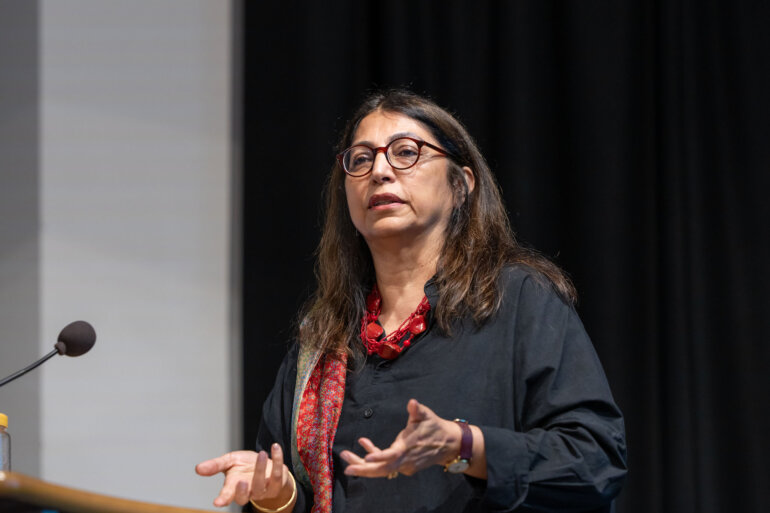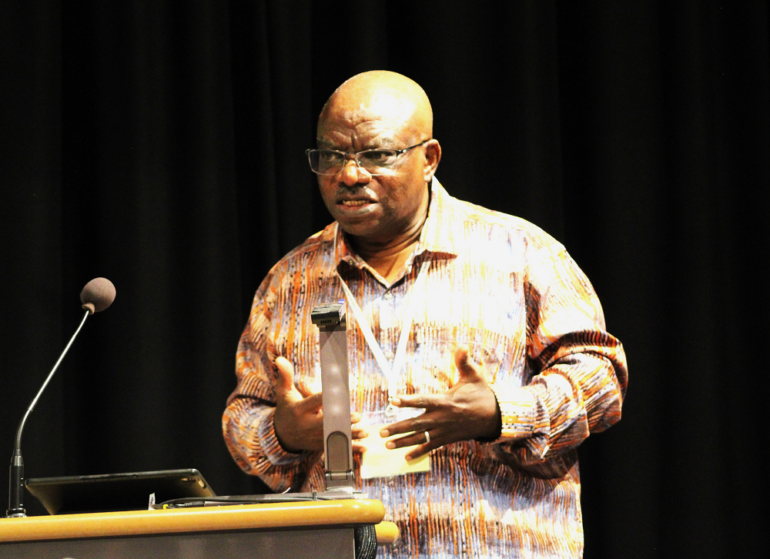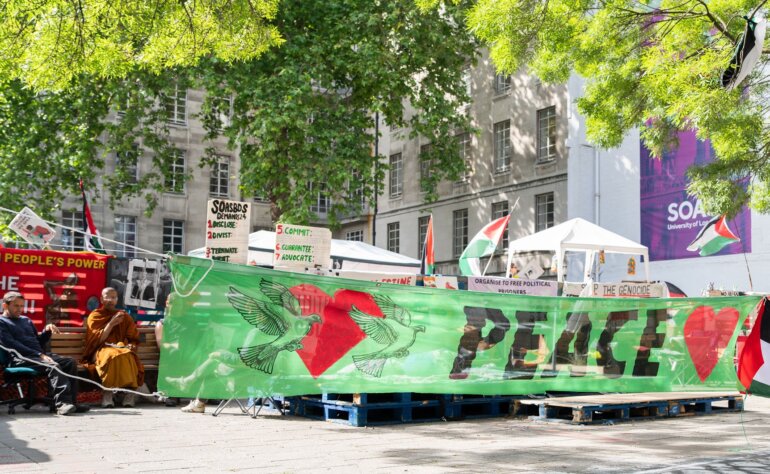Social justice and development in a polarising world: rights and representation; redistribution and restoration; and reproduction and production.
SOAS Department of Development Studies and Department of Economics conceived the theme for DSA2024 and within that overall theme, the conference had three strands:
- rights and representation – highlighted by keynote speaker Shirin Rai, sponsored by the journal Oxford Development Studies
- redistribution and restoration – highlighted by keynote speaker Naomi Hossain, sponsored by the Journal of Development Studies
- reproduction and production – highlighted by keynote speaker Jimi Adesina and sponsored by the Journal of International Development
Who does social reproductive work when you’re doing political work/activism?

That was one of the questions asked by Distinguished Research Professor in the Department of Politics and International Studies at SOAS, Shrin Rai. Her talk was inspired by her book ‘Depletion: the Human Costs of Caring’, the talk ‘Social Reproduction, Depletion, and/in Crisis’. Shirin Rai’s talk examined work and pursuing redistribution through political activism to centre social justice.
“Reproduction of life doesn’t just happen. It is laboured over in different contexts with different resources unequally. In all countries, classes, races and cultures, women perform these labours more than men. But these women are classed, and treated in differential and deeply unequal ways and experience depletion in different ways, intersectionality.” She pointed out that activism requires labour, which can lead to depletion and burn out. “Social movements require a redistribution of social work.” She concluded that transformation and struggles towards it need more radical approaches that challenge the status quo.”
What happens when people stop being poor?

SOAS Professor Naomi Hossain, used the arts to highlight contradictions of what it means to ‘not be poor’ anymore in the context of Bangladesh. Her talk asked questions of how we as development thinkers lose interest at precisely the point people stop being poor and rarely reflect on how moving out of poverty changes people and our place in the world, or on the problem (for that is what it is) of new wealth. Her talk observes how Bangladesh has been studied for its history of poverty and as a laboratory for testing aid, or what Giorgio Agamben called ‘bare life‘ – and now in the context of the climate crisis. However she points out we are now seeing new visions in Bangladesh which is “celebratory, funny, cosmopolitan, funny knowing and very current.” She showcased a range of art which demonstrated.
She called for a need for more than measurement of GDP growth for Bangladesh to truly move out of poverty and: “It will need for its people to live beautiful and creative lives and to tell their stories on the world stage. Bangladesh’s rich and vibrant artistic heritage give it a comparative advantage but they need to invest vastly more in the education system and higher education. They need to support the cultural institutions that enable and broaden lifelong learning. Creativity and innovation don’t just happen, they are invested in to give space to flourish and require open and competitive politics where the people decides who rules in power. Only then we are able to say we are no longer poor.”
The state is not always responsible for rights

Jimi Adeṣina is Professor and the South African Research Chair in Social Policy at the College of Graduate Studies, at the University of South Africa. His talk explored ‘Re-reading the right to development: imperative of sovereign national project and policy sovereignty’. He explored the right of nation states to development and the rights of individuals (the human rights approach to development) contrasting the interface between the state’s rights and obligations against a shift in the meaning to the right to development to refer to an individual’s rights. He positioned his talk from the perspective of colonised countries, quoting Nkrumah that neocolonialism is power without responsibility and exploitation without redress. He added that “the experience of the sub Saharan African countries have been the simultaneous violation of the national sovereign right to development and that of the individual rights to development.”
He concluded that a “sovereign national project in a multi-ethnic multi-religious context must make nation building a critical element in its development path and requires a leadership call that is trans-ethnic and trans-religion in orientation and disposition.” He said successful sovereign projects needed to recapture the spirit of the Lagos Plan of Action. Adding, it was necessary to “appreciate the value of collective self-reliance among African countries to overcome the limitations of geography, national fragmentation, and a relatively small population at individual country levels.” He called for “a collective strategy for structural transformation of African economies is necessary for securing self-sustaining social and economic development that is ecologically sustainable.”
Action and solidarity

It was not possible to host a conference on this theme without considering the plight of those in conflict and the mass atrocities taking place at this point in time. Alessandra Mezzadri, in her introduction at the conference, said: “I would like to acknowledge the genocide taking place in Palestine as well as large scale violence taking part in a large part of our planet including Ethiopia and Sudan,” and called for an immediate end to the unacceptable violence. Members also drew attention to mass conflict in other areas which are not presently receiving as much attention as Palestine.
The issue in Gaza was also raised by DSA members who circulated a letter (headed ‘Let’s Talk About Palestine’) for the DSA Council, in relation to academic silence around the situation in Palestine. Four specific issues were raised in the letter: aid whitewashing; solidarity with academics in Palestine; solidarity with encampments in SOAS; and the IHRA definition of anti-semitism that is currently being used by some academic institutions. At the conference, DSA President Uma Kambhampati met with the authors of the letter to identify areas where the letter’s requests met the DSA’s remit. The situation in Gaza was also raised in the AGM when Uma reported back on Council’s deliberations on the issue over the year. Council will report back on actions that arise from the letter.
In response to members’ comments around the conflict, Shirin Rai reminded us: “Under conditions of unparalleled and unremitting and indiscriminatory bombing, the reproduction and maintenance of life becomes impossible”. To take inspiration from Shirin’s talk, “we must reimagine a world with sustainable and reflexive solidarities that link networks working to reverse depletion.”
The conference hosted a panel on: Professionalism and activism in development cooperation: negotiating identities, exploring meanings that discussed many of these tensions and challenges around activism in the international development cooperation sector, and we welcome outputs of this panel – and other reflections on social justice in a polarising world – to be shared by members on the DSA website as a blog or opinion piece. Please contact Rowena, the communications officer, for more information.
